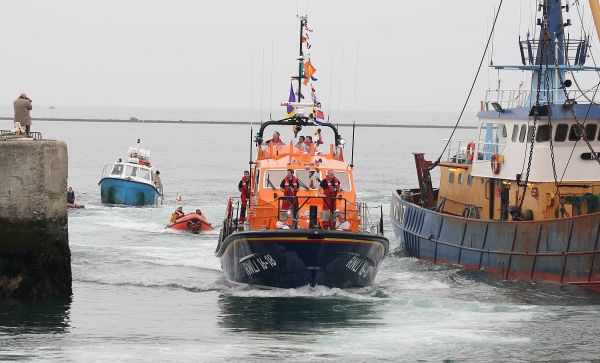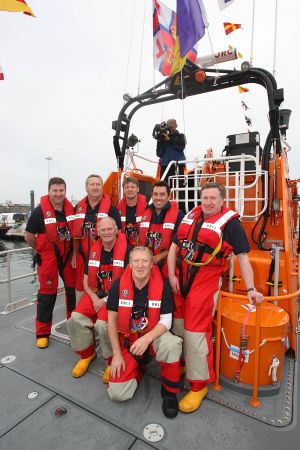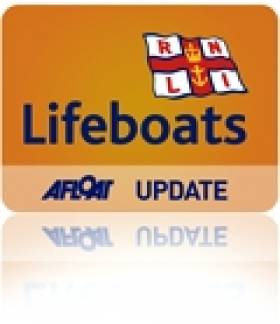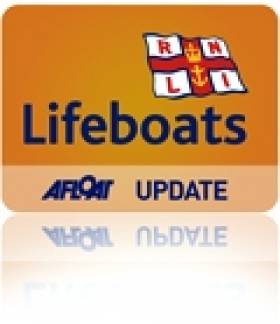Displaying items by tag: RNLB The Famous Grouse
The Tamar Arrives!... At Kilmore Quay
The lifeboat was funded by a legacy from Mrs Mary Weeks from Surrey in England who passed away in 2006. Mrs Weeks met her husband while on a cruise off the west coast of Scotland on a boat named Killarney.

The RNLB Killarney on her maiden arrival yesterday to Kilmore Quay, Co. Wexford.
She also has a strong RNLI connection through her maiden name Distin. Mrs Weeks was related to the Coxswain of Salcombe lifeboat Samuel Distin and to Albert Distin. Both men lost their lives in the Salcombe lifeboat disaster of 1916.
The lifeboat hull was moulded by the RNLI and fitted out in Plymouth under RNLI supervision. Lifeboat crewmembers based in Kilmore Quay have undertaken comprehensive training at the lifeboat college in Poole and onboard the Tamar class lifeboat in preparation for their new arrival.
The new lifeboat is not expected to go on service until later in the month and the next few weeks will be spent training the rest of the lifeboat crew on the new boat. RNLI Deputy Divisional Inspector Gareth Morrison said, " This is a huge day for the RNLI in Ireland. The arrival of any lifeboat is a great celebration for a community but when it is the first of a new class of lifeboat the excitement is even greater.
The Kilmore Quay lifeboat crew have been looking forward to this day for a long time. Their last lifeboat the Famous Grouse rescued over 300 people since 2004 and this lifeboat station has had many challenging rescues in its history. I wish them the very best of luck with their new lifeboat, may she have many successful years ahead of her." Kilmore Quay lifeboat Coxswain Eugene Kehoe added, "It's a proud day for Kilmore Quay.

The crew of the RNLB Killarney
A new lifeboat is a tremendous gift and we will take very good care of it. We are very grateful to the donor who by leaving this legacy to the RNLI has provided a lifeboat that will go on to save many lives at sea.
On a bad night miles out to sea it is good to know that we have a state of the art lifeboat and a highly trained lifeboat crew to respond to every situation." The new Tamar class lifeboat is 16.3 metres in length with a maximum speed of 25 knots compared to the 14.3 metres of the current Tyne class lifeboat stationed at Kilmore Quay, which has a maximum speed of 18 knots.
The lifeboat is self-righting and is fitted with an integrated electronics Systems and Information Management System, which allows the lifeboat crew to monitor, operate and control many of the boats systems from shock mitigating seats. The Tamar also carries a Y boat (an inflatable daughter boat) which is housed under the aft deck and deployed from a hinged door in the transom. The lifeboat has room for 44 survivors. It will replace the current Kilmore Quay Tyne class lifeboat The Famous Grouse, which will be retired to the RNLI relief lifeboat fleet.
Related Safety posts
RNLI Lifeboats in Ireland
Safety News
Rescue News from RNLI Lifeboats in Ireland
Coast Guard News from Ireland
Water Safety News from Ireland
Marine Casualty Investigation Board News
Marine Warnings
New Tamar-Class Lifeboat: A First for RNLI in Ireland
Next month sees the introduction of the first RNLI Tamar-class lifeboat to enter service at an Irish lifeboat station, writes Jehan Ashmore.
The Tamar-class is the latest high-tech craft within the RNLI lifeboat fleet in use throughout the UK. Around 17 craft of the class, named after
the River Tamar, Cornwall have entered service. Some of the class are constructed exclusively for the purposes of providing relief duties across
the extensive network of 235 lifeboat stations throughout the UK and Ireland.
One of these relief lifeboats, RNLB Frank and Ann Wilkinson (16-06) arrived in Dun Laoghaire in July from Poole, Dorset, the headquarters of the RNLI. The lifeboat carried out crew training exercises, not just for the local lifeboat crew but other station crews as part of the Irish divisional staff training programme.
The fleet is divided into two categories: inshore and all-weather class lifeboats (ALB). Of the ALB's there are currently five classes: Tyne, Mersey, Trent, Severn and Tamar. These boats can be operated safely in all weathers and are designed to self-right in the event of a capsize.
The lifeboats are fitted with navigation, location and communication equipment with the RNLI policy of operating each craft for around 25 years. The introduction of the RNLB Killarney at Kilmore Quay will enhance the organisation's vital services off the south-east coast.
Related Safety posts
RNLI Lifeboats in Ireland
Safety News
Rescue News from RNLI Lifeboats in Ireland
Coast Guard News from Ireland
Water Safety News from Ireland
Marine Casualty Investigation Board News
Marine Warnings






























































